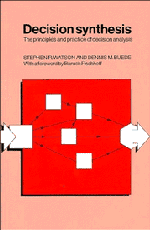3 - DECISION THEORY
from PART I - THEORY
Published online by Cambridge University Press: 16 September 2009
Summary
In the previous chapter we argued that, to assist people in thinking through complex decision problems, a quantitative framework is needed to encourage consistency, the essence of rationality. Decision theory provides such a framework, and in this chapter we give an account of this theory. We start, in Section 3.1, with value function theory, which is concerned with conflicting objectives. In Section 3.2 we discuss uncertainty, and how the calculus of probability may be used to describe it. Section 3.3 contains a description of utility theory, which is concerned with decision-making in the face of uncertainty, and in Section 3.4 we show how uncertainty and conflicting objectives may be handled at the same time. Finally, in Section 3.5, we discuss other approaches to creating a calculus for decision-making.
CONFLICTING OBJECTIVES
We all make decisions all the time. What clothes shall I wear this morning? What shall I have for lunch? Shall I watch television or read a book? Most of us have no difficulty in deciding matters like these, but on occasion we find ourselves spending a lot of mental effort in making up our minds. Choosing a career and then a particular job, or where to live, often falls into this category.
Information
- Type
- Chapter
- Information
- Decision SynthesisThe Principles and Practice of Decision Analysis, pp. 18 - 80Publisher: Cambridge University PressPrint publication year: 1988
